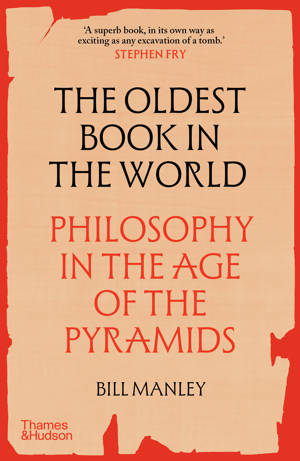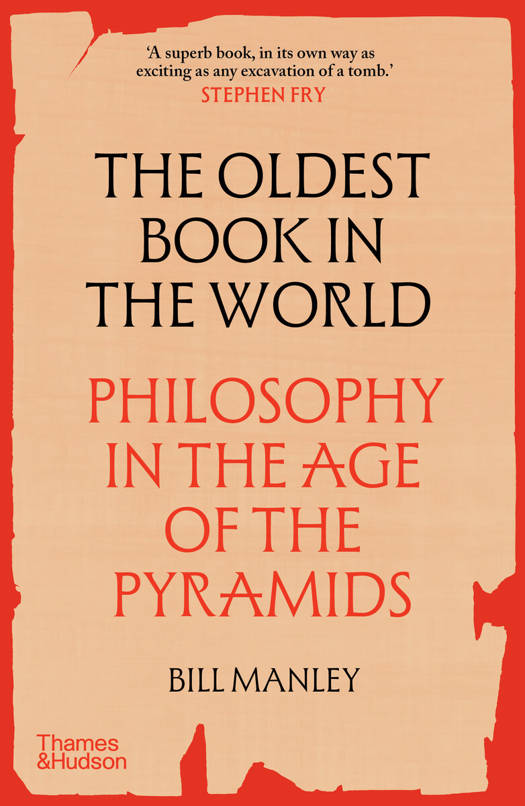
- Retrait gratuit dans votre magasin Club
- 7.000.000 titres dans notre catalogue
- Payer en toute sécurité
- Toujours un magasin près de chez vous
- Retrait gratuit dans votre magasin Club
- 7.000.0000 titres dans notre catalogue
- Payer en toute sécurité
- Toujours un magasin près de chez vous
The Oldest Book in the World
Philosophy in the Age of the Pyramids
Bill Manley
Livre broché | Anglais
18,45 €
+ 36 points
Format
Description
A brand-new translation of a philosophical classic of the ancient world, The Teaching of Ptahhatp, written in Egypt 4,000 years ago.
The Teaching of Ptahhatp, composed two millennia before the birth of Plato, is the oldest surviving statement of philosophy in the ancient world and the earliest witness to the power of the written word. It ought to begin the list of the world’s philosophy classics, yet it has been largely forgotten since it was rediscovered in the nineteenth century. Egyptologist Bill Manley’s new translation corrects this oversight, rendering into approachable modern English for the first time Ptahhatp’s profound yet practical account of ‘the meaning of life’, written many centuries before the supposed dawn of western philosophy.
Manley introduces Ptahhatp, who served as Vizier to the Old Kingdom pharaoh Izezi (c. 2410–2375 BC), and the world of dynamic ideas and new technologies – writing among them – within which he worked, illuminating the nuances of his language and philosophy. In addition, Manley’s new translation of Why Things Happen, the oldest surviving account of creation from anywhere in the world, reveals how Ptahhatp’s account of the human condition is founded in distinctive ancient Egyptian beliefs about the nature of truth and reality. Taken together, Manley’s new translations and expert commentary provide a new perspective on the Pyramid Age and overturn traditional prejudices about the origins of writing and philosophy. The ‘oldest book in the world’ is a testament to a common thread that connects humanity across time; Ptahhatp grapples with the pitfalls of greed, ambition, celebrity, success, confrontation, friendship, sex and even the office environment, and his teachings remain remarkably relevant in the modern day.
The Teaching of Ptahhatp, composed two millennia before the birth of Plato, is the oldest surviving statement of philosophy in the ancient world and the earliest witness to the power of the written word. It ought to begin the list of the world’s philosophy classics, yet it has been largely forgotten since it was rediscovered in the nineteenth century. Egyptologist Bill Manley’s new translation corrects this oversight, rendering into approachable modern English for the first time Ptahhatp’s profound yet practical account of ‘the meaning of life’, written many centuries before the supposed dawn of western philosophy.
Manley introduces Ptahhatp, who served as Vizier to the Old Kingdom pharaoh Izezi (c. 2410–2375 BC), and the world of dynamic ideas and new technologies – writing among them – within which he worked, illuminating the nuances of his language and philosophy. In addition, Manley’s new translation of Why Things Happen, the oldest surviving account of creation from anywhere in the world, reveals how Ptahhatp’s account of the human condition is founded in distinctive ancient Egyptian beliefs about the nature of truth and reality. Taken together, Manley’s new translations and expert commentary provide a new perspective on the Pyramid Age and overturn traditional prejudices about the origins of writing and philosophy. The ‘oldest book in the world’ is a testament to a common thread that connects humanity across time; Ptahhatp grapples with the pitfalls of greed, ambition, celebrity, success, confrontation, friendship, sex and even the office environment, and his teachings remain remarkably relevant in the modern day.
Spécifications
Parties prenantes
- Auteur(s) :
- Editeur:
Contenu
- Nombre de pages :
- 240
- Langue:
- Anglais
Caractéristiques
- EAN:
- 9780500298077
- Date de parution :
- 30-07-24
- Format:
- Livre broché
- Dimensions :
- 129 mm x 198 mm
- Poids :
- 274 g

Les avis
Nous publions uniquement les avis qui respectent les conditions requises. Consultez nos conditions pour les avis.






